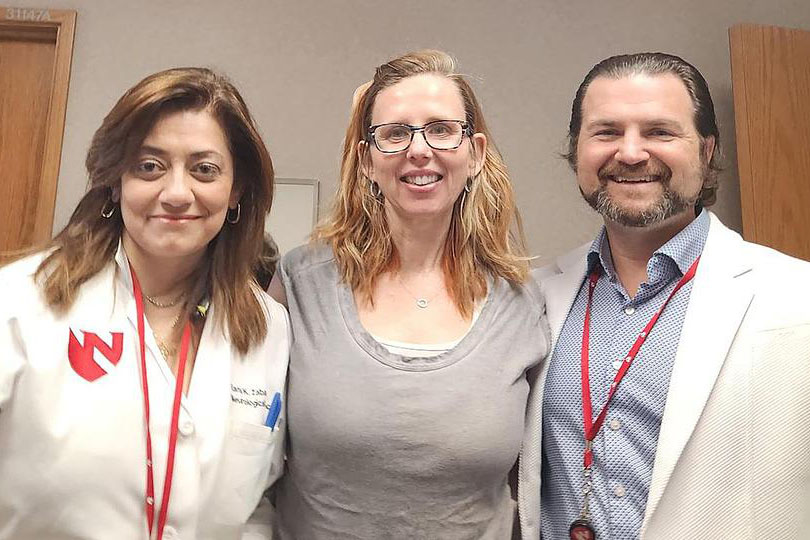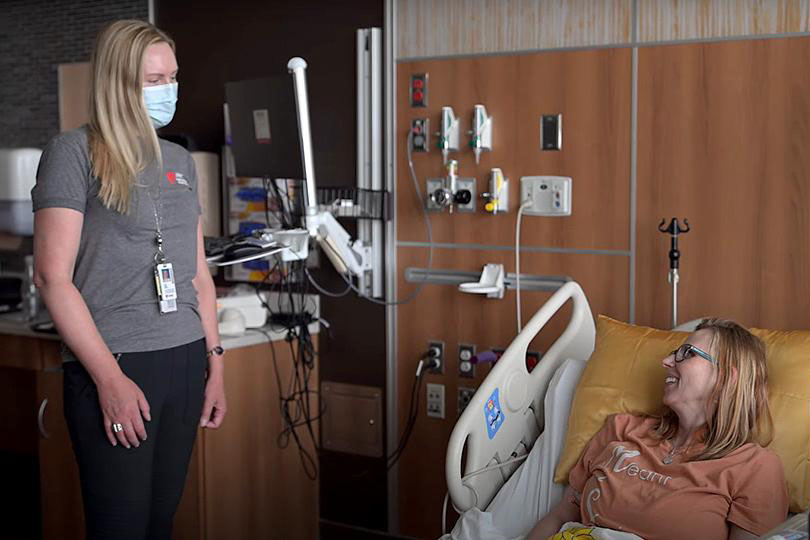Jan Janisch-Hanzlik had been having strange symptoms for several years. But it was a sensation that started in her toes and crept up her right side that really concerned her. “By the end of the week, I had a spinal tap, an MRI of the brain and spine and was diagnosed with MS,” she said. “I thought I would get on meds, and within a month or two, I’d be back to my normal self.”
But just three months later, the 49-year old’s condition had advanced to the point where she could no longer drive and had to move into a new home after falling multiple times.
She was referred to Rana Zabad, MD, a neurologist and MS specialist at Nebraska Medicine, who presented her with a new option: enrollment in a first-of-its-kind clinical trial using allogeneic CAR T-cell therapy. This therapy uses T-cells from a healthy donor that are genetically modified to target and destroy specific immune cells that contribute to the autoimmune attack in MS. It’s an approach previously used by Nebraska Medicine hematologists to treat blood cancers.
“This is a completely novel concept in MS therapy,” said Dr. Zabad, who also is a professor and director of the Multiple Sclerosis Program at UNMC. “We’ve never used allogeneic CAR T-cell therapy to target the immune cells responsible for driving inflammation and damage in the central nervous system. This trial is about pushing boundaries carefully and thoughtfully to explore what could be possible.”
Click Play below to watch this video on Jan Janisch-Hanzlik’s story.
Jan received the therapy on June 9 at Nebraska Medicine’s Fred & Pamela Buffett Cancer Center under the care of Matt Lunning, DO, a hematologist/oncologist specializing in CAR T-cell therapy. She was discharged on June 16 and has since returned for follow-up care.
“There is growing hope that this therapy can do more than treat patients with blood cancers like leukemia and lymphoma,” said Dr. Lunning, also a professor in the UNMC Division of Oncology and Hematology. “A year ago, we provided the first allogeneic CAR T-cell therapy to a patient with lupus, and she has seen excellent results. We’re hopeful Jan will have a similar experience.”

Jan says she’s honored to be part of something potentially transformative. “I feel blessed that Dr. Zabad chose me for this treatment,” she said. “I’m not just excited for me I’m excited for the whole MS community including the physicians and the patients because it’s really going to help all of us in the long run.”
The CAR T-cell therapy process required a short course of chemotherapy to prepare Jan’s immune system, followed by the infusion of genetically engineered donor T-cells. These modified cells are designed to seek out and destroy the specific immune cells believed to contribute to MS. Allogeneic therapy offers a readily available, “off-the-shelf” product, since the cells don’t need to be custom-made for each patient as they do with autologous CAR T-cell therapy, which uses the patient’s own cells.
“Jan’s courage and optimism have been incredible,” said Dr. Zabad. “She understands this trial is not just about today’s treatment, it’s about what this could mean for thousands of others living with MS.”
In addition to the groundbreaking clinical care, Jan says the personal care she received at Nebraska Medicine has made a lasting impact. “I cannot even explain the care I’ve been given here. It has been absolutely amazing,” she said. “The nurses are so responsive. I love that they have a mobility assistant to walk with you in the halls. And I really have a lot of faith and trust in Dr. Zabad.”

Wow. How does one get an opportunity to be part of this trial. I’ve suffered from relapsing remitting MS for over 38 years. I have been told to “wait and see,” to Copaxone, to Beta Seron (?), to another drug they rather quickly took off the market, to Gilenya, and now I’m back in “wait and see.” I suffer from bowel and bladder incontinence, and lack of balance now. I walk with a cane. I am willing to try anything if it can help push different therapies for MS.
This is encouraging to read! I was diagnosed with MS 29 years ago!!!
I have MS was diagnosed in 2019 I’m sure I had longer
I’m 63 so I might be eligible for MS therapy
I also have a niece with MS she is 34
I have been on Aubagio at first then Kesimpta and now Mavenclad I think Mavenclad is not very good I’m trying to get something different but my MS doctor says no have done blood tests
I live 50 or 60 miles west and have a daughter that is right by the North Doctors building
Been on Mavenclad for about 8 months
I too am very interested in this treatment. I have had Ms since 1994, and my rrms converted to spms five years ago. How do I get involved?
Sign me up!!
How do you get signed up for the trial? I have secondary ms. Im 45 years old. I’ve done a bunch of the meds but nothing has worked. My walking is my biggest problem. I use a walker. I would love to try this.
Health care providers and patients can search the UNMC Clinical Trials Databases to find a study specific to a particular condition or disease.
The link is: https://net.unmc.edu/ctsearch/index_unmc.php
Also I’ve had ms for20 years.
I have MS I have an aunt that died with this disease at 52 yrs old and I have a niece that was diagnosed with MS at 33 yrs a really good friend had MS and died at 55 yrs old so yes I am very interested in this disease I hope my niece will never go though the things I have to now I’m 63 yrs old diagnosed in 2019 I hope they find a cure or stop this from progressing this might be able to help a lot of people
Very interesting I had a short 3 months of a chemo for so etching else and the 6 -12 months after that I felt the best I had since 2006.
I would be very interested in this and I’m in Iowa so it’s only a couple hour drive for me. I do that to see my neurologist so I would be willing to do that. Plus I’ve been a patient in me for gi issues so I’ve been there.
Amazing to hear a breakthrough. How long before approved? I would love to walk without a cane, as I have had deteriorating health for 25 years. Dr’s. say that I have not had any attacks since the original one. So many of us waiting to hear progress in the MS world. Would love to join trial, anything to help please.
I was diagnosed with MS by Georgetown Hospital in DC about 30yrs ago. It has been horrible but I am still fighting. Two yrs ago I was diagnosed with PPMS by John Hopkins. Hopkins last month said I have nothing left to use for my fight. Because I am over sixty there are no more DMT’s for me. I am left on my own because of age and no meds for me. I would be THRILLED to have this when available
I was diagnosed with ppms 7 years ago. Medication seems to have stopped my lesion progression but mobility is deteriorating. It’s wonderful to see the doctors and patients progressing solutions that did not exist a short time ago. Like all others here “pick me”. I’ll do whatever I can to find solutions.
I was diagnosed at 28, with PPMS. I am 63 now and have a myriad of issues. I live in north Central Kansas and would love to be a part of a study. Not only to lessen some of my symptoms, but to help other people as well. Please send me information on how to get involved.
My husband is a patient for MS and it is sad his own neuroligist didnt even bring this up. We are trying so hard to keep him in his career amd she knows this and have him convinced disability is the only way to go even though he isnt disabled. We asked about Stem Cell Therapy studies and wad essentially told it isnt FDA aooroved so we are not discussing them. This would have been nice to know about and I would still love information on it to see if he would even qualify.
I have MS was diagnosed in 2019 I’m sure I had longer
I’m 63 so I might be eligible for MS therapy
I also have a niece with MS she is 34
I have been on Aubagio at first then Kesimpta and now Mavenclad I think Mavenclad is not very good I’m trying to get something different but my MS doctor says no have done blood tests
I live 50 or 60 miles west and have a daughter that is right by the North Doctors building
Been on Mavenclad for about 8 months
I have MS 63 yrs old so maybe to old for this therapy I also have a niece that is 34 yrs old that has MS
Had an aunt die with it at 52 yrs old I hope they can stop this from progressing I know it would help alot of people that have it
Yes I think it can even help older people live better
I know there is no cure for this disease but hopefully they can help alot of people stop the progression
I have MS I’m 63 so might be to old for therapy trials
I was diagnosed 2019 in Fremont Nebraska by Dr Tella
I have a niece that that has been diagnosed with MS she is in Iowa I not far from UNMC I’m interested because I don’t want other people to go through this disease without something that can help
Been on Aubagio, Kesimpta, now have had Mavenclad last dose of Mavenclad was the end of January so will be 8 months I would like something different cause mavenclad is not working
I hope my niece never has to go through this this disease is not fun I hope they can help alot of people with this I HOPE
I can stay with daughter who lives about 3 or 4 miles from the North Doctors building I’m about 50 or 60 miles west of Omaha
I would love to find out about this therapy. I am 65 now. I was diagnosed in 1978 when I was 18. I now know I had my first symptom when I was 10 years old. I have been on Tysabri, Gilenya, and a few others, including one dose of Mavenclad. Then I switched doctors and have been on Aubagio since 2021. I started with PPMS and now have Secondary Progressive. I have not had a full exacerbation since 1982, but this devil keeps progressing, and my MRIs are getting very white..
Six years ago, I discovered that my walking issues were not MS but caused by Scoliosis and other assorted back troubles, probably caused by my gait, which, to my surprise, has been off for years. I use a mobility scooter for anything more than just going out to dinner. I have been fortunate, but I would still love to try this and stop the progression. I have friends who could also use this. My whole MS support group will be excited when I forward this. Fingers crossed for everyone!
I would love to join trial for this amazing trial!!! I just found out I’ve had MS for over 30 yrs- bad left drop foot, on walker at 54. Oh please- somehow can I sign up! God bless these researchers!
How do you sign up for this treatment? I am in San Diego